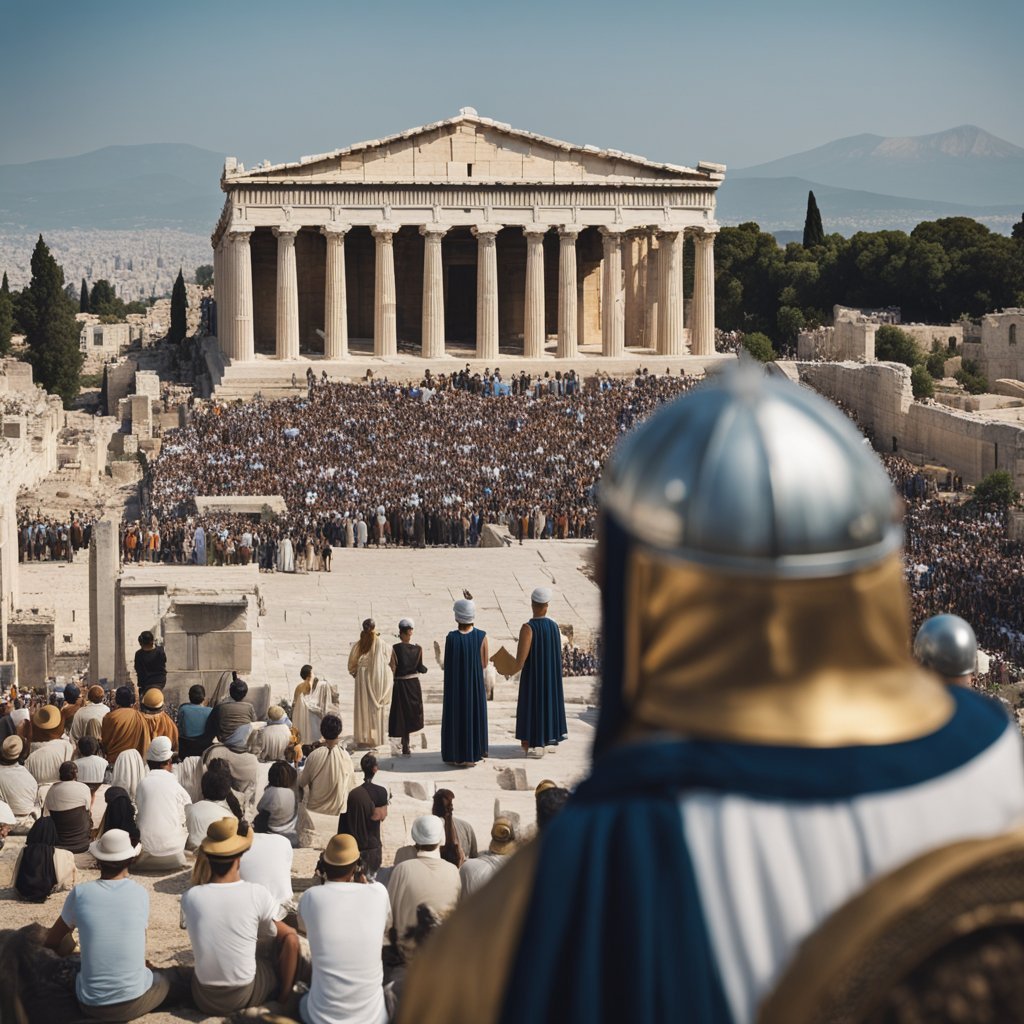Pericles of Athens is a name that resonates through history, synonymous with the Golden Age of Athens. Born around 495 BCE, this influential statesman and general played a pivotal role in shaping Athenian democracy and expanding its empire. He led Athens during a time of unprecedented cultural and political achievement, laying the foundations for many aspects of Western civilization that we value today.
His contributions went beyond politics; he was instrumental in fostering an environment where arts and philosophy flourished. The construction of the Acropolis, with its iconic Parthenon, stands as a testament to his vision and leadership. These structures not only represented religious and civic pride but also became symbols of Athens’ cultural supremacy.
Pericles’ legacy is also marked by his role in the Peloponnesian War, where his strategies and speeches, particularly the Funeral Oration, showcased his oratory skills and his ability to inspire the Athenian people. His efforts solidified his reputation as “the first citizen of Athens,” a title given by the historian Thucydides. This complex and multifaceted leader left an indelible mark on history, making him a compelling figure worthy of exploration.
Life and Legacy of Pericles

Pericles was a key figure in ancient Athens, known for his political leadership during the city’s Golden Age and his contributions to democracy, architecture, and culture. His impact is evident through the structures, policies, and historical records he left behind.
Early Life and Background
Pericles was born around 495 BCE into an aristocratic family. His father, Xanthippus, was a well-respected politician and war hero, and his mother, Agariste, belonged to the influential Alcmaeonidae family. This noble lineage afforded Pericles immense prestige and wealth from an early age. His family’s background and standing played a significant role in shaping his future political career.
From his youth, Pericles was known for his intellectual pursuits and was influenced by prominent thinkers. His education under philosophers like Anaxagoras helped develop his skills in rhetoric and leadership. This foundation was crucial for his later success as a statesman and orator.
Political Career
Pericles first emerged on the political scene in 472 BCE when he financed a production of Aeschylus’ plays. His formal political career began in 463 BCE when he prosecuted Cimon, advocating for a more aggressive policy towards expansion. Over the years, Pericles rose to prominence, becoming a leading figure in Athenian politics.
He was instrumental in advancing democracy in Athens. By reducing the power of the aristocracy and involving ordinary citizens in the decision-making process, he laid the groundwork for a more inclusive governance system. Pericles’ policies and leadership significantly shaped the political landscape of Athens.
The Golden Age of Athens
The period of Pericles’ leadership is often referred to as the Golden Age of Athens. Under his guidance, the city saw remarkable cultural, artistic, and intellectual advancements. He initiated the construction of the Parthenon and other significant structures on the Acropolis, solidifying Athens’ reputation as a center of art and learning.
During this time, Athens flourished economically and militarily. Pericles’ vision and policies helped Athens dominate the Delian League, transforming it into an Athenian empire. The city’s prosperity and cultural achievements during this period were unmatched, highlighting Pericles’ effective leadership.
The Peloponnesian War
Despite the successes of the Golden Age, Pericles’ tenure was not without challenges. The Peloponnesian War between Athens and Sparta marked a significant period in his leadership. Starting in 431 BCE, the war tested Athens’ resilience and Pericles’ strategies. He adopted a defensive approach, focusing on protecting the city and avoiding direct land battles with Sparta.
Pericles’ strategy was to rely on Athens’ naval superiority and fortifications. Although initially successful, his policies faced criticism as the war dragged on and hardships increased. Nonetheless, his leadership during the war demonstrated his commitment to Athens and its preservation.
Death and Impact
Pericles died in 429 BCE during a plague that devastated Athens in the early years of the Peloponnesian War. His death marked the end of an era for Athens. Despite the immediate challenges following his death, Pericles’ legacy endured through the institutions he strengthened and the cultural achievements he inspired.
His vision for a democratic and thriving Athens set standards for subsequent generations. The architectural and political advancements during his leadership have left a lasting mark on history. Pericles is remembered as a pivotal figure who shaped the course of Athenian society and its historical legacy.
Cultural Achievements

During his leadership, Pericles notably advanced the arts, architecture, and philosophical thought in Athens, marking a high point in Greek cultural history. His efforts fostered an era of creativity and intellectual growth that left a lasting impact on Western civilization.
Patronage of the Arts
Pericles was a champion of the arts. He funded numerous projects that celebrated Athenian culture. Under his patronage, theater, particularly tragedy and comedy, flourished. Prominent playwrights like Sophocles and Euripides thrived. He also supported the visual arts, commissioning sculptures and paintings that depicted Athenian life and gods.
Musicians and poets received backing, enhancing Athens’ cultural landscape. This support created a vibrant environment for artistic innovation, laying the groundwork for the rich artistic heritage of Greece.
Architectural Contributions
Pericles’ most famous architectural feat was the development of the Acropolis. He initiated the construction of the Parthenon, a temple dedicated to the goddess Athena. This iconic structure showcased classical Greek architecture with its Doric columns and intricate sculptures.
Other notable structures include the Propylaea, a grand entrance to the Acropolis, and the Erechtheion, known for its Caryatid Porch. These buildings not only advanced architectural techniques but also symbolized Athenian democracy and cultural pride.
Philosophical Influence
Pericles’ era was also significant for the blossoming of philosophy. He was a friend and supporter of philosophers like Anaxagoras and Protagoras. Their ideas on science, ethics, and rhetoric found fertile ground in Athens, influencing both public and private life.
This intellectual atmosphere encouraged debate and rethinking traditional beliefs. The philosophical inquiries and rational thought of this period set the stage for later thinkers like Socrates, Plato, and Aristotle, cementing Athens’ role as a cradle of Western philosophy.

